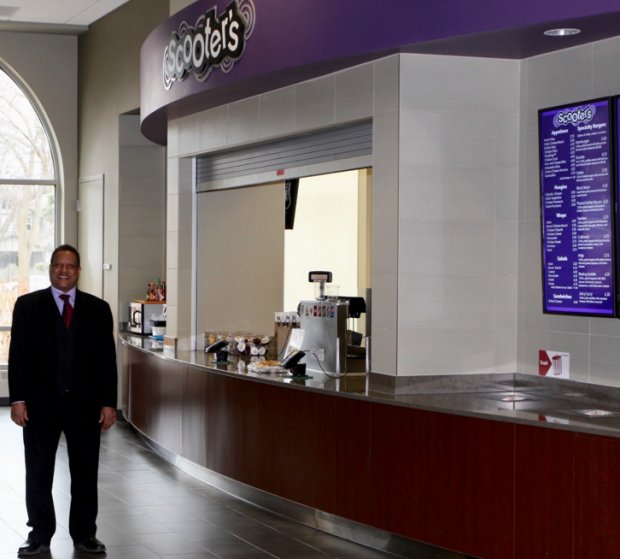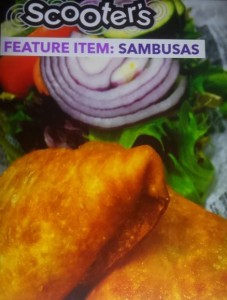
Mohamed Omer is a refugee, immigrant, entrepreneur and business owner, and is bringing a new flavor to campus.
Omer immigrated to Minnesota from Ethiopia in 2001 and since has started his own food company with the help of his wife’s multicultural cooking. Their company, Alimama Sambusa Land, offers a fusion of Mediterranean and East African flavors.
Omer’s journey to the United States and St. Thomas community, however, was not easy. The entrepreneur spent a large part of his life building up companies in Ethiopia, just to see them taken away due to political movements led by the military junta in his country in 1974 and 1975.
The military junta organized the Ethiopian workers, farmers and students against the regime under the slogan “Land to the Tiller” in a quest for democratic rights. Omer, a member of the Ethiopian Youth Association, participated in the political movement. However, this movement failed, leading to a dictatorship led by the Dergue political party.
“Dergue started arresting, vouchering and killing students who refused its iron-fist rule,” Omer said.
When he was 24 years old in 1982, Omer traveled for eight days from Ethiopia to Djibouti, a small neighboring country, to escape persecution.
Once in Djibouti, Omer found ways to make money, but because of his refugee status business was hard to find. Eventually, he started turning a profit by setting up a business importing and buying hides and skins.
“I went to the person I knew in Ethiopia with the idea. He formed the company under his name, and allowed me to operate the business as a manager even though I actually owned the business,” Omer said. “Business was booming, and there was excellent profit.”
In 1986, however, the Ethiopian and Djiboutian governments decided that all Ethiopian refugees had to be deported. Omer fled again, this time from Djibouti to Somalia.
“I went to Somalia and I received a warm welcome. Now I saw another business opportunity exporting livestock to Yemen and Egypt from Somalia. I formed a company,” Omer said.
But the cycle of destruction continued.
“What happened was the civil war in 1990. I lost everything there. Somalia was destroyed. I became a refugee for the third time,” Omer said.
In 1999, Omer’s family traveled to Minnesota, where one of his five children, Kamal Mohamed, attended St. Thomas, graduating in 2012. Mohamed is now following in his dad’s entrepreneurial footsteps and is working on his second startup in San Francisco.
Mohamed is grateful for all that his parents sacrificed for him and his siblings.
“Around 1999, my parents kind of decided that in order to give us the best chance to actually succeed and live out our dreams, we immigrated to Minnesota,” Mohamed said. “Obviously, when you are younger you don’t really see the sacrifices that your parents make, but as we got older, I think we really got to see just how much they have really given up.”
Omer followed his family to the U.S. two years later after having trouble leaving Africa. Omer found himself in many different offices in Minnesota until he was able to follow his true passion of a creating a catering business.
“I was an interpreter. I speak six languages,” Omer said. “I have a degree in accounting and business, so I got a job for the county accounting. But while I am doing this I am not satisfied. I am always thinking what to do and how to create my business.”
During potlucks for his office jobs, Omer’s contributions of sambusas were always the biggest hit.

“Because of that, they wanted to increase the number of potlucks,” Omer said.
This interest in his cooking inspired him to get out from behind the desk and do something that he was passionate about.
“I saw the opportunity; the food business is very good. Not just in Minnesota, but in America,” Omer said. “People like food, and they have buying power. Those two are very important.”
Omer committed to starting a business to spread the food that he loves in the country that he calls home, sambusas being the specialty item.
“It’s a tortilla for the cover, but the filling is the No. 1 thing. There is vegetarian and lentils, chicken or fish inside,” Omer said. “This food is dominating all over Africa. It is a finger food, very easy, very nice. I wanted to take it mainstream.”
Omer’s mother-in-law is well-traveled and used her knowledge of different countries’ flavors to come up with the company’s sambusa. Omer’s wife inherited these recipes and is in charge of making the dish.
“Sambusa is different in India than Middle East, and different in the Middle East than Africa. So, fusion — we created our own product,” Omer said.
After finalizing the recipes for the sambusas, Omer searched for a place to distribute the food. He has found many venues, including St. Thomas’ Scooter’s.
As executive student worker at Scooter’s, junior Rocky Austin was excited to give his customers cultural food choices.
“We wanted to give our customers the opportunity to try foods from different cultures, so we’ve added the sambusas with the choice of lentil or bean to the menu,” Austin said.
Austin got to try the sambusas and was surprised by their great flavor.
“Honestly, they’re pretty good,” Austin said. “They were better than I expected.”
Marissa Groechel can be reached at groe5630@stthomas.edu.

